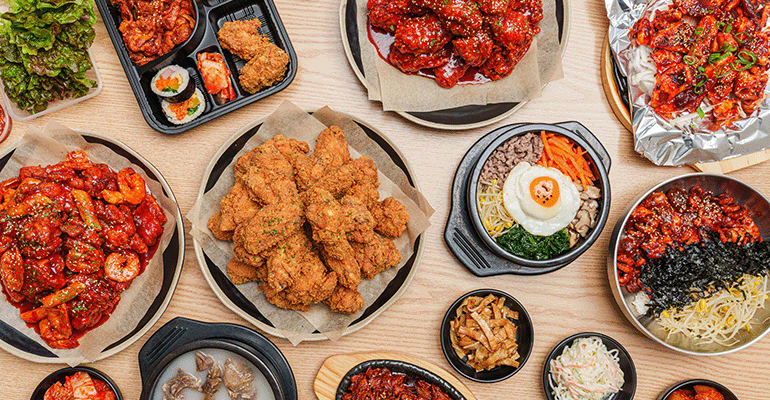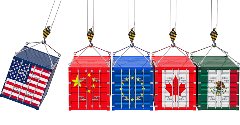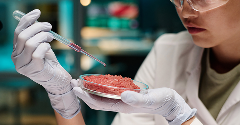News
South Korea launches campaign to correct mistranslated food
6 Dec 2024The Seoul city government has created a new campaign to promote standardised foreign-language names for Korean food to overcome translation errors.

The initiative aims to promote traditional Korean dishes and correct mistranslations from literal translations or automated-based wording in order to enhance culinary tourism by attaching accurate translations to its food for international visitors.
Updating and correcting mistranslated descriptions
“Bear tang” for gomtang (beef bone soup), “six times” for yukhoe (beef tartare), “chicken a–hole house” for stir-fried chicken gizzards, “lifestyle meat” for raw meat and “dynamic stew” for pollack stew are among some of the notable mistranslations that tourists may encounter when surveying Korean cuisine on menus, The Korea Herald gave as examples.
According to the Seoul Metropolitan Government, errors in Korean food translations like these result from literal translations or automated services. As such, these incorrect translations lack the authenticity behind these traditional dishes.
Another common problem is that multiple translations of prevalent Korean dishes may also be present. The Seoul city government also noted that the Ministry of Culture, Sports and Tourism introduced “shinchi” as the official Chinese translation for “kimchi”. However, while this has been adopted, the incorrect translation “pao cai” is still used in Korea. Through its latest campaign, South Korea aims to highlight the correct, singular translations for menus that include the common ingredient, “kimchi”.
In July 2024, South Korea announced the launch of its ‘Taste Your Korea’ initiative designed to boost gastronomic tourism. The Ministry of Culture, Sports and Tourism (KTO) announced its new food tourism campaign slogan, Taste Your Korea, designed to appeal to tourists and position the country as a leading food destination. Alongside its slogan, South Korea also introduced 33 representative regional dishes, seasonal ingredients and alcohol types as core campaign components.
Restaurants play an active role
As part of its current campaign, Seoul’s city government highlights that the correct translations are available online via the Seoul Foreign Language Dictionary. The dictionary includes 30,253 English entries, 28,900 Chinese entries and 29,610 Japanese entries. The city officials said these entries can be a reliable guide for restaurateurs. As such, they can refer to these to ensure their menus accurately represent Korean cuisine when translated into other languages.
The campaign has seen the government reach out to restaurants in tourist-heavy destinations within the capital. The city also announced its plan to create multilingual digital menu boards for 400 select restaurants visited by tourists.
“Accurate naming is vital for introducing our cuisine to the world,” said Kim Young-hwan, director general of the tourism bureau of the city government, cited in The Korea Herald/ANN. “We urge restaurants to play an active role in advancing Seoul’s culinary tourism by adopting standardised translations from the Seoul Foreign Language Dictionary and ensuring their menus accurately represent Korean dishes to international visitors,” added Young-hwan.
A long-term campaign for international growth
Sitting in the backdrop to South Korea’s current campaigns is its $40 million Korean Cuisine to the World 2009 initiative, which saw the country pledge the multi-million cash injection to appeal to international visitors. The Asian food hub saw its then-president Lee Myang-bak strive to grow the country’s culinary footprint overseas.
In the 15 years since its launch, the investment seemingly worked. Data shows that the number of Korean restaurants in China increased from 2,024 in 2009 to 15,989 in 2017. Over the same period, Korean restaurants in Japan rose from 4,916 to 9,388 and went from 1,046 to 2,247 in the US food scene.
However, while satisfaction with Korean food was growing internationally, a poll showed that awareness of Korean dishes and ingredients was lacking. In 2018, the Korean Food Promotion Institute found that while 88% of the US population was satisfied with the country’s cuisine, only 63% were aware of them. This figure was even lower in Europe, with 85% finding South Korean food satisfying but only 57% aware of the country’s culinary dishes.
The Anholt-Ipsos Nation Brands Index (NBI) 2023 which recognises countries around the globe for their investment and travel popularity, placed South Korea at 24 out of 60. The country dropped one place from its 2022 figure and was nine away from South Korea’s goal of making it to the top 15.
A 2022 Korea Chamber of Commerce & Industry awareness survey found that half (50.7%) of respondents said Korean Cuisine is well-rooted internationally. However, only a quarter (25.7%) believed these restaurants had positive business potential. To increase the prevalence of South Korean food around the world, the country’s cuisine is homing in on creating a global image and branding.
Related news

Future F&B flavours favour exploration and explosive taste profiles
25 Mar 2025
Exploration and experimentation will define the future of flavour, according to Mintel, as consumers seek out taste profiles and textures that offer an adventurous eating experience.
Read more
Partnership plans to scale cultivated meat production
21 Mar 2025
Food technology innovator Ever After Foods (EAF) and multinational food leader Bühler are striving to overcome hurdles to access and accelerate the development of cultivated meat.
Read more
Global consumers enjoy food less and perceive it as less healthy
20 Mar 2025
Enjoyment of food and its perceived healthiness is dwindling among most global populations, according to findings from Gallup and Ando Foundation/Nissin Food Products.
Read more
Seafood set to ‘dethrone’ poultry as protein growth king
19 Mar 2025
Seafood is poised to surpass poultry as the leading contributor to global protein supply growth this year, according to Rabobank’s latest protein outlook.
Read more
Tariff volatility leaves food manufacturers in limbo
11 Mar 2025
Rapid US trade policy shifts and tariff escalations are creating uncertainty for food manufacturers and ingredient suppliers.
Read more
F&B industry hit with fresh greenwashing claims
26 Feb 2025
The food and beverage (F&B) industry is under fresh scrutiny amid claims of greenwashing, with Arla the latest company in the firing line.
Read more
Protein diversification: A massive missed market?
20 Feb 2025
Germany and the UK could be missing out on the massive market for alternative meats and proteins, with one new coalition calling for an end to the “steak-tofu struggle”.
Read more
Have scientists discovered a new tool to measure UPFs?
19 Feb 2025
Researchers have developed a new scoring system and database, compiling over 50,000 food items, of which over 1,000 are classified as ultra-processed.
Read more
China ramps up cultivated meat research with new innovation base
18 Feb 2025
China has opened its first fermentation and cultivated meat research centre in Beijing.
Read more
Most consumers lack trust in AI, but supplement users are ready to embrace the technology
14 Feb 2025
A survey of UK and US consumers found that most supplement users are willing to let AI make decisions on their behalf, but they also demand greater transparency.
Read more